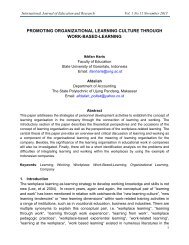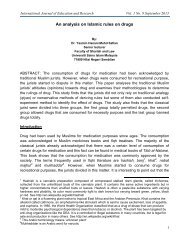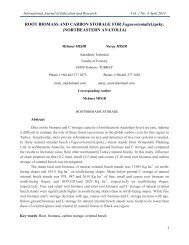A Special Case of Pathetic Fallacy: Papini's Picasso - International ...
A Special Case of Pathetic Fallacy: Papini's Picasso - International ...
A Special Case of Pathetic Fallacy: Papini's Picasso - International ...
Create successful ePaper yourself
Turn your PDF publications into a flip-book with our unique Google optimized e-Paper software.
ISSN: 2201-6333 (Print) ISSN: 2201-6740 (Online)<br />
www.ijern.com<br />
never wear, or for some expensive champagne that you will never drink!<br />
Identity theft is as we know it, a real danger in a world <strong>of</strong> actors! If someone else acts better<br />
than myself as me, then he must be me! Then who am I, after all? This is a hard question to answer,<br />
if you ask me! And believe it or not, even in Pablo <strong>Picasso</strong>'s life (and everyone knows who <strong>Picasso</strong><br />
is, right?) there was a moment when he had to answer to this difficult question!<br />
Why had he this unpleasant opportunity? Because, at that particular moment, <strong>Picasso</strong> was a<br />
victim, and the most important thing about this is that <strong>Picasso</strong> was the victim <strong>of</strong> <strong>Picasso</strong>. He became<br />
the victim <strong>of</strong> his own image, <strong>of</strong> his own fame, <strong>of</strong> the celebrity <strong>of</strong> the name <strong>Picasso</strong> to which himself<br />
was abiding because that name, the image he constructed under it made him rich, made him far<br />
more important than people usually are for other people, distanced him from the momentum when<br />
surviving meant only a problem <strong>of</strong> a belly to fill and a place to rest your back on.<br />
Who did the acting part, being <strong>Picasso</strong> against <strong>Picasso</strong> in such a convincing way that the real<br />
<strong>Picasso</strong> had to fight back in order to regain his identity? Who took this role to such perfection that<br />
even today, after more than half a century from the time their play had been played, some people, or<br />
should I say persons, continues to mistake one <strong>Picasso</strong> for the other?<br />
He had to be a good actor, indeed, and this actor's name was Giovanni Papini (Papini, 1952,<br />
pp. 265-268). An artist <strong>of</strong> letters, not <strong>of</strong> paint, that's all you need in order to create a convincing<br />
spoken/written image <strong>of</strong> a man who deals mainly with paint and brushes, but who has the guts to<br />
tell his story from time to time using words also. Let us see what <strong>Picasso</strong> is supposed to have said<br />
about himself:<br />
In art the mass <strong>of</strong> people no longer seeks consolation and exaltation but those who are<br />
refined, rich, unoccupied, who are distillers <strong>of</strong> quintessences seek what is new, strange,<br />
original, extravagant, scandalous. I myself, since Cubism and before, have satisfied these<br />
masters and critics with all the changing oddities which passed through my head, and the less<br />
they understood me, the more they admired me. By amusing myself with all these games,<br />
with all these absurdities, puzzles, rebuses, arabesques, I became famous and that very<br />
quickly. And fame for a painter means sales, gains, fortune, riches. And today, as you know, I<br />
am celebrated, I am rich. But when I am alone with myself I have not the courage to think <strong>of</strong><br />
myself as an artist in the great and ancient sense <strong>of</strong> the term. Giotto [and] Titian, Rembrandt<br />
[and Goya] were great painters: I am only a public entertainer who has understood his times<br />
and exploited as best he could the imbecility, the vanity, the cupidity <strong>of</strong> his contemporaries.<br />
Mine is a bitter confession, more painful than may appear, but it has the merit <strong>of</strong> being<br />
sincere. (Papini, 1952, as cited in Brink, 2007, p. 60)<br />
Some scholars took the time to avert us on the falseness <strong>of</strong> the interview Papini said he have<br />
had with <strong>Picasso</strong>. Some others still rely on this story as if it were true and, after all, in this world <strong>of</strong><br />
smoke and mirrors, who could really blame them? Is there a pronounced scent <strong>of</strong> immorality<br />
stemming out <strong>of</strong> this particular counterfeiting <strong>of</strong> reality? It could be the case, if we could only<br />
maintain the previous sentence, when we said that the real <strong>Picasso</strong> had to fight back in order to<br />
regain his identity. Who was the real <strong>Picasso</strong>?<br />
Was he a man, an individual who used his natural given talents to build a pedestal for his<br />
6





